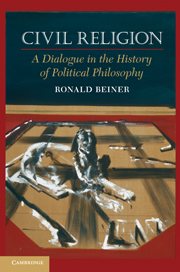Book contents
- Frontmatter
- Contents
- Preface and Acknowledgments
- Introduction
- Part I Machiavelli, Hobbes, Rousseau
- Part II Responses to (and Partial Incorporations of) Civil Religion within the Liberal Tradition
- Part III Theocratic Responses to Liberalism
- Part IV Postmodern “Theism”
- 29 Nietzsche, Weber, Freud
- 30 Nietzsche's Civil Religion
- 31 Heidegger's Sequel to Nietzsche
- Conclusion
- Index
- References
30 - Nietzsche's Civil Religion
Published online by Cambridge University Press: 05 June 2012
- Frontmatter
- Contents
- Preface and Acknowledgments
- Introduction
- Part I Machiavelli, Hobbes, Rousseau
- Part II Responses to (and Partial Incorporations of) Civil Religion within the Liberal Tradition
- Part III Theocratic Responses to Liberalism
- Part IV Postmodern “Theism”
- 29 Nietzsche, Weber, Freud
- 30 Nietzsche's Civil Religion
- 31 Heidegger's Sequel to Nietzsche
- Conclusion
- Index
- References
Summary
[T]he idea of the eternal recurrence [bars the evasion] into the blind secularization of man.
– Karl LöwithI will say it again: what seems to be essential “in heaven and on earth” is that there be obedience in one direction for a long time. In the long term, this always brings and has brought about something that makes life on earth worth living – for instance: virtue, art, music, dance, reason, intellect – something that transfigures, something refined, fantastic, and divine. The long un-freedom of spirit, the mistrustful constraint in the communicability of thought, the discipline that thinkers imposed on themselves, thinking within certain guidelines imposed by the church or court or Aristotelian presuppositions, the long, spiritual will to interpret every event according to a Christian scheme and to rediscover and justify the Christian God in every chance event, – all this violence, arbitrariness, harshness, terror, and anti-reason has shown itself to be the means through which strength, reckless curiosity, and subtle agility have been bred into the European spirit.
– Friedrich NietzscheIt is easy to view Nietzsche and Heidegger as heroic atheists. This is a radically incomplete view; in fact, their mortal opposition to liberalism and to everything associated with a liberal philosophy of life forces them to embrace what amounts to a radicalized version of antiliberal theocracy. One can understand why a reader of Nietzsche like George Grant can conceive Nietzsche as “the first great explicit right-wing atheist.” This view, however, does not capture the whole story of Nietzsche's complicated stance toward theism in general or even Christian theism in particular.
If we want to think about Nietzsche in the context of civil-religion theorizing, here is a good puzzle to start with: Why does Nietzsche loathe the Protestant Reformation to the extent that he does (“spiritually unclean and boring,” “spiritually stale,” “lazy,” “a homoeopathy of Christianity,” “a recrudescence of Christian barbarism”)? Furthermore, Nietzsche is hardly in the business of “saving” Christianity by identifying more effete and less effete versions of it; so why does he see the move from Catholic Christianity to Protestant Christianity as a kind of inner corruption of Christian theism (“[a]ctual superiority of Catholicism”)? The short answer is that Nietzsche, like Max Weber after him, sees a decisive connection between Protestantism and modernity, and his hatred of modernity is such that he cannot restrain himself from hating Protestantism as a correlate of modernity – even if Protestantism helps to hurry along the decrepitude of Christianity itself. The purpose of this chapter is to offer a more detailed account of this intriguing, paradox-ridden Nietzschean view of religion.
- Type
- Chapter
- Information
- Civil ReligionA Dialogue in the History of Political Philosophy, pp. 374 - 394Publisher: Cambridge University PressPrint publication year: 2010

